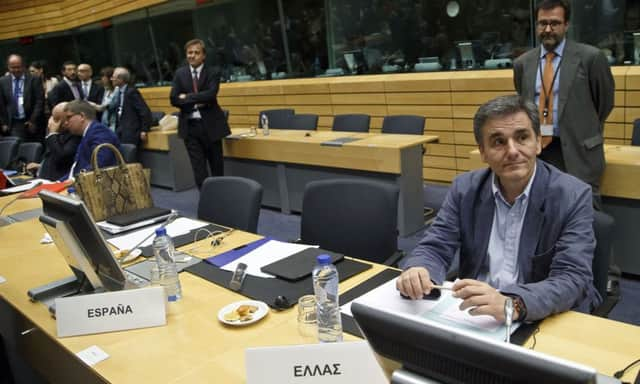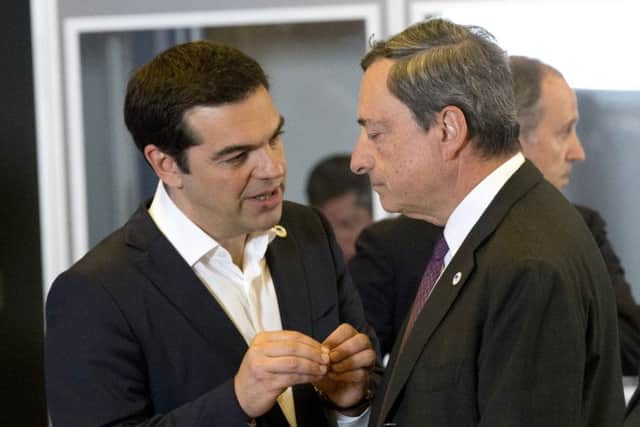Eurozone anger as Greece arrives without plan


With Greece’s banks just days away from a potential collapse that could drag the country out of the euro, Mr Tsipras had yesterday been expected to offer up economic reforms to tackle his country’s £230 billion debt mountain in exchange for loans.
Instead, his government said it would present a plan today.
The newly appointed Greek finance minister Euclid Tsakalotos failed to provide any new “concrete proposals” on its debt crisis on how his country could win support for a financial bailout at yesterday’s hastily called meeting of eurozone finance ministers.


Advertisement
Hide AdAdvertisement
Hide AdInstead, Mr Tsakalotos provided an update of the financial crisis in Greece.
Mr Tsipras is to address the European Parliament today in a last-ditch bid to obtain substantial debt relief.
Lithuanian president Dalia Grybauskaite said: “You know, there was a promise for today. Then, they’re promising for tomorrow. For the Greek government it’s every time, ‘manana’.”
Mr Tsipras had been buoyed by a triumph in Sunday’s referendum, where an overwhelming majority of Greeks backed his call to reject the reforms that creditors had last proposed. But domestic victory did not give him much leverage with foreign creditors, who know Mr Tsipras needs a deal soon to keep his country afloat.
Banks have been shut for seven working days and will not reopen before tomorrow, cash withdrawals have been limited to around £40, and daily business throughout the country has come to a near standstill.
European leaders expressed surprise Mr Tsipras did not yet have a written proposal for new financial bailout.
Dutch prime minister Mark Rutte said: “I’m extremely sombre about this summit. I’m also sombre about the question of whether Greece really wants to come up with proposals, with a solution.”
Greece’s 18 eurozone partners have steadfastly said they want to help Greece stay in the currency, but have just as often complained about the country dragging its feet during months of negotiations.
Advertisement
Hide AdAdvertisement
Hide AdGerman chancellor Angela Merkel warned Mr Tsipras that he was “dancing close to the financial abyss”.
“We are no longer talking about weeks but very few days,” she said.
An official from a eurozone nation said that Greece’s failure to bring clear proposals to an earlier meeting of finance ministers caused widespread frustration.
Mr Tsakalotos instead made a presentation and discussed key issues.
“Everybody was angry,” said one official.
The eurozone’s top official, Eurogroup president Jeroen Dijsselbloem, said he hoped the Greek government would make a written request by last night or this morning to tap Europe’s bailout fund.
Once that request is in, the eurozone finance ministers would hold a teleconference to discuss the proposals.
One big sticking point in the talks is Greece’s demand that the terms of its bailout loans be made easier.
European officials are split on the issue, with lead eurozone lender Germany still reluctant.
Advertisement
Hide AdAdvertisement
Hide AdThe International Monetary Fund (IMF) last week called for European states to accept longer repayment rates and lower interest rates on their loans to Greece.
Many economists say that Greece’s debt burden, at almost 180 per cent of annual GDP, is unsustainable for a country its size.
Greek banks are running out of cash even after the government shut them last week and placed limits on how much depositors can withdraw or transfer.
Normal commerce is now impossible in Greece. Small businesses, lacking use of credit cards or money from bank accounts, were left to rely on cash coming from diminishing purchases from customers.
Greeks are holding on tight to what they have. And suppliers are demanding businesses pay cash up front.
Giorgos Kafkaris, a 77-year-old pensioner, was among Greeks standing in line to withdraw cash at an Athens ATM yesterday.
“I came to get the €120 (£85), I can’t take more. The good thing is we had sorted things out earlier and we had €200-300 set aside,” he said.
“I’m waiting for something better for all of us. I believe something better will happen.”
Advertisement
Hide AdAdvertisement
Hide AdMr Tsipras’s appointment of Mr Tsakalotos as the new finance minister to lead talks with creditors was interpreted as a sign he may be willing to compromise. Mr Tsakalotos, a 55-year-old economist, replaced Yanis Varoufakis, who constantly clashed with his peers.
The lack of progress on Greece worried stock markets in Europe, where the Stoxx 50 index of top companies was down 2.1 per cent yesterday. The euro also fell, while Greece’s stock market has remained shut since last week amid the bank closures.
Greece has been granted two bailout programs worth a total of €240 billion in loans from other eurozone countries and the IMF.
But the spending cuts and tax increases demanded as a condition for the loans have hit growth, causing an economic depression and pushing unemployment to 25 per cent.
The government has been slower than hoped in making the economy more competitive and selling state assets to raise money.
European Commission president Jean Claude Juncker said he wanted to “prevent a Grexit” and called on all those involved to put “ego” to one side in discussions in Brussels.
Speaking to the European Parliament, Mr Juncker said it was not clear what the result of Sunday’s referendum meant, as the Greeks had been asked to vote on an out-of-date version of the package on offer from creditors.
“With all due respect to the views expressed by the Greek people, the commission would like to know what this vote means,” said Mr Juncker.
Advertisement
Hide AdAdvertisement
Hide Ad“I’m told that it is not a ‘No’ to Europe. I’m told it’s not a ‘No’ to the euro. It can’t be a ‘No’ to the institutions’ proposals because they were no longer on the table.
“So I would have liked an explanation of the vote from the Greek prime minister. The ball is firmly in the Greek government’s court. Today in Brussels the Greek Government must explain how it plans to move forward in this debacle.”
How financial contagion could begin tearing through the Balkans
There is a saying in the Balkans: “Indebted like Greece.” The expression is believed to have originated in the 19th century, when the south-east of Europe was engulfed in wars and poverty. It has taken on new significance since Greece’s financial crisis worsened.
Millions of people in Serbia, Albania, Bulgaria, Macedonia and Romania have their deposits in Greek bank subsidiaries in their own countries, putting the Balkans on the front line of the crisis.
• BULGARIA - It is the most exposed to the Greek crisis, with Greek lenders accounting for about 23 per cent of its banking system. Should Greek banks collapse, they could take the deposits and savings of its customers with them. The Bulgarian government might also have to intervene to rescue them. Some 7 per cent of its exports go to Greece.
• MACEDONIA - It has introduced capital controls to stem outflows of money to Greece from subsidiaries in Macedonia. Two Greek banks in Macedonia represent 22 per cent of total bank assets in the country. The central bank has ordered Macedonian banks to withdraw all loans and deposits from banks based in Greece. The regulator also temporarily banned the country’s residents from investing in Greek securities.
• SERBIA - It has also limited the amount of money Greek banks can send back to their parent companies in Greece. The Serbian central bank said the Greek banks have adequate liquidity and reserves, which “can be used in situations where bad news can cause unnecessary negative consequences and psychological stress”. Serbia, however, has relatively high public debt and fiscal deficit, meaning it could run into trouble if it had to bail out Greek-owned banks in Serbia.
Advertisement
Hide AdAdvertisement
Hide Ad• ALBANIA - Three out of 16 commercial banks operating in Albania are Greek. Albanian authorities have assured depositors they should fear nothing from the Greek crisis. But it would also struggle to rescue any Greek bank subsidiaries and could suffer from weaker trade ties. Sherefedin Shehu, former deputy finance minister, warned more trouble in Greece would cause Albania’s economic growth to fall.
• ROMANIA - There are four Greek-owned banks in Romania and they own 12 per cent of the overall market. Two of them are among the top ten banks in terms of size. Romanian National Bank Governor Mugur Isarescu said the banks could weather unfavourable developments and had a high level of solvability.
• SLOVENIA - Although there are no Greek banks operating in Slovenia, the eurozone member is exposed to the Greek crisis through its funding of aid to Greece. It has 661 million euros tied up in loan guarantees and 264 million euros in direct aid. Foreign Minister Karl Erjavec recently said it is hard to believe Slovenia will ever get back the direct aid loans. The sums are big for Slovenia - its exposure to Greek debt amounts to 3.2 per cent of GDP, the highest besides Greece among the 19 nations that use the shared euro currency.